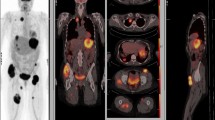Abstract
Cancer progression from the primary site to the regional lymph nodes and beyond to the distant sites through the lymphovascular system is genetically determined. In general, sentinel lymph node in the regional lymph nodes is the gateway for metastasis. Biomarkers are becoming increasingly important to define different phases of metastasis. With further understanding of the molecular mechanisms of metastasis, more targets are available for selective therapeutic intervention so that effective therapy can be delivered against cancer in a more personalized approach.
Similar content being viewed by others
References
Leong SP (2006) Proceedings of the 1st International Symposium on Cancer Metastasis and Lymphovascular System: basis for rational therapy, 28–30 April 2005, San Francisco, California, USA. Cancer Metastasis Rev 25(2):157–294
Leong SP (2007) Cancer metastasis and the lymphovascular system : basis for rational therapy. Cancer treatment and research. Springer, New York
Leong SP (2009) From local invasion to metastatic cancer; involvement of distant sites through the lymphovascular system. Humana Press/Springer, New York
Leong SP (2011) The pivotal role of the lymphovascular system in cancer metastasis. J Surg Oncol 103:639–641
Morton DL, Wen DR, Wong JH et al (1992) Technical details of intraoperative lymphatic mapping for early stage melanoma. Arch Surg 127:392–399
Reintgen D, Cruse CW, Wells K et al (1994) The orderly progression of melanoma nodal metastases. Ann Surg 220:759–767
Leong SP (2004) Paradigm of metastasis for melanoma and breast cancer based on the sentinel lymph node experience. Ann Surg Oncol 11:192S–197S
Morton DL, Cochran AJ, Thompson JF (2005) Sentinel node biopsy for early-stage melanoma: accuracy and morbidity in MSLT-I, an international multicenter trial. Ann Surg 242:302–311; discussion 311–313
Hellman S (1994) Karnofsky memorial lecture. Natural history of small breast cancers. J Clin Oncol 12:2229–2234
Leong SP, Gershenwald JE, Soong SJ et al (2011) Cutaneous melanoma: a model to study cancer metastasis. J Surg Oncol 103:538–549
Thompson JF, Soong SJ, Balch CM et al (2011) Prognostic significance of mitotic rate in localized primary cutaneous melanoma: an analysis of patients in the multi-institutional American Joint Committee on Cancer melanoma staging database. J Clin Oncol 29:2199–2205
Gershenwald JE, Soong SJ, Balch CM (2010) TNM staging system for cutaneous melanoma…and beyond. Ann Surg Oncol 17:1475–1477
Baehner FL, Li R, Jenkins T et al (2012) The impact of primary melanoma thickness and microscopic tumor burden in sentinel lymph nodes on melanoma patient survival. Ann Surg Oncol 19:1034–1042
Futreal PA, Coin L, Marshall M et al (2004) A census of human cancer genes. Nat Rev Cancer 4:177–183
Baehner FL, Lee M, Demeure MJ et al (2011) Genomic signatures of cancer: basis for individualized risk assessment, selective staging and therapy. J Surg Oncol 103:563–573
Becker D, Mihm MC, Hewitt SM et al (2006) Markers and tissue resources for melanoma: meeting report. Cancer Res 66:10652–10657
Murphy MJ (2012) Diagnostic and prognostic biomarkers and therapeutic targets in melanoma. Humana Press/Springer, New York
Flaherty KT, Yasothan U, Kirkpatrick P (2011) Vemurafenib. Nat Rev Drug Discov 10:811–812
Beecher C (2002) Metabolomics: the newest “omics” sciences. Innov Pharm Technol 2:57–64
Witte MH (2011) Translational/personalized medicine, pharmaco/surgico/radiogenomics, lymphatic spread of cancer, and medical ignoromes. J Surg Oncol 103:501–507
Peppercorn J, Perou CM, Carey LA (2008) Molecular subtypes in breast cancer evaluation and management: divide and conquer. Cancer Invest 26:1–10
van de Vijver MJ, He YD, van’t Veer LJ et al (2002) A gene-expression signature as a predictor of survival in breast cancer. N Engl J Med 347:1999–2009
Rosenwald A, Wright G, Chan WC et al (2002) The use of molecular profiling to predict survival after chemotherapy for diffuse large-B cell lymphoma. N Engl J Med 346:1937–1947
Potti A, Mukherjee S, Petersen R et al (2006) A genomic strategy to refine prognosis in early-stage non-small-cell lung cancer. N Engl J Med 355:570–580
Slamon DJ, Leyland-Jones B, Shak S et al (2001) Use of chemotherapy plus a monoclonal antibody against HER2 for metastatic breast cancer that overexpresses HER2. N Engl J Med 344:783–792
Lynch TJ, Bell DW, Sordella R et al (2004) Activating mutations in the epidermal growth factor receptor underlying responsiveness of non-small-cell lung cancer to gefitinib. N Engl J Med 350:2129–2139
Amado RG, Wolf M, Peeters M et al (2008) Wild-type KRAS is required for panitumumab efficacy in patients with metastatic colorectal cancer. J Clin Oncol 26:1626–1634
Flaherty KT, Puzanov I, Kim KB et al (2010) Inhibition of mutated, activated BRAF in metastatic melanoma. N Engl J Med 363:809–819
Schilsky RL (2010) Personalized medicine in oncology: the future is now. Nat Rev Drug Discov 9:363–366
Weinberg RA (2007) The biology of cancer. Garland Science, New York
Paget G (1889) Remarks on a case of alternate partial anaesthesia. Br Med J 1:1–3
McShane LM, Altman DG, Sauerbrei W et al (2006) Reporting recommendations for tumor marker prognostic studies (REMARK). Breast Cancer Res Treat 100:229–235
Nass SJ, Moses HL (eds) (2007) Cancer biomarkers: the promises and challenges of improving detection and treatment. National Academies Press, Washington
Hellman S (1997) Darwin’s clinical relevance. Cancer 79:2275–2281
Tobler NE, Detmar M (2006) Tumor and lymph node lymphangiogenesis—impact on cancer metastasis. J Leukoc Biol 80:691–696
Rinderknecht M, Detmar M (2008) Tumor lymphangiogenesis and melanoma metastasis. J Cell Physiol 216:347–354
Pantel K, Brakenhoff RH (2004) Dissecting the metastatic cascade. Nat Rev Cancer 4:448–456
Morton DL, Hoon DS, Cochran AJ (2003) Lymphatic mapping and sentinel lymphadenectomy for early-stage melanoma: therapeutic utility and implications of nodal microanatomy and molecular staging for improving the accuracy of detection of nodal micrometastases. Ann Surg 238:538–549; discussion 549–550
Author information
Authors and Affiliations
Corresponding author
Rights and permissions
About this article
Cite this article
Leong, S.P.L., Witte, M. Biomarkers of cancer metastasis through the lymphovascular system: future perspectives. Clin Exp Metastasis 29, 861–864 (2012). https://doi.org/10.1007/s10585-012-9522-0
Received:
Accepted:
Published:
Issue Date:
DOI: https://doi.org/10.1007/s10585-012-9522-0




